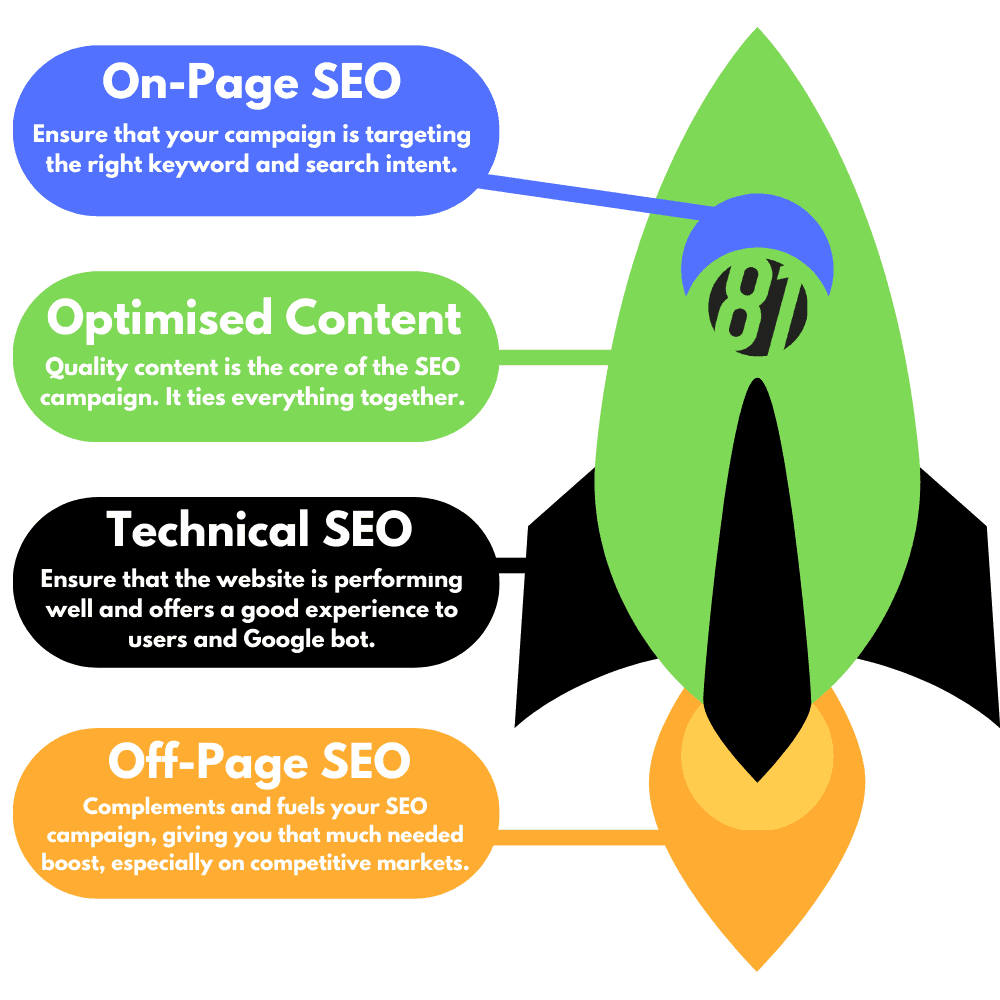For many, Search Engine Optimisation (SEO) seems to be as complicated as rocket science, however I can assure you that this is not entirely the case.
The hardest part about SEO is actually keeping up with the industry, the new strategies, the new technologies and the numerous algorithm updates that Google implement on a very regular basis.
We work for a wide range of clients and so we have developed ways to adapt and apply our SEO campaigns to the many different industries we operate in.
That being said, there are some elements to an SEO campaign that remain timeless and essential.
1. The Foundation: On-Page SEO
This activity consists of optimising a web page by editing its source code. There are a few areas in the source code that are important for your targeted keywords. Your page title, your headings, your URL and to some extent, your page description. Although some of these elements won’t be clearly visible to you or your visitors on the page itself, rest assured that Googlebot (the automated crawler that Google sends to visit your site regularly), will read it and take it into consideration when attributing a search engine ranking to your page.
That’s why it is primordial to target the right keyword and make sure it is displayed on the most important places on your page. Furthermore, these elements will appear on your search engine listing, and will more than likely impact searchers on whether they wish to visit your site or not. See example below:
URL in green: Main Keyword
Meta Description in grey: Brand + Main Keyword + Location
2. The Frame: Content
Content is the most powerful part of any marketing campaign. Capturing your audience’s attention and conveying your message the right way is crucial for any business. Yet when we approach this from an SEO point of view, fabricating the best copy can be a little more complicated…
Creating SEO optimised content means writing for human readers first and foremost while making sure it’s easily understandable by the search engines crawlers. You must do so in a seamless manner so that your article remains readable whilst also making it obvious to search engines what it actually is. Bots don’t read content the way that humans do.
But how do we do that? There are a few elements that we can use:
- Making sure that we have enough instances of the keyword that we want to target.
- Trying to cover the topic through angles that are relevant to the query (what, when, where, why, how).
- Add experts’ quotes, related images and link out to authority sites on the matter.
- Stay on topic and ensure that you don’t deviate too much from it.
3. The Maintenance: Technical SEO
Technology evolves rapidly and that includes how your website functions but also the way that search engines operate. Technical SEO involves staying on top of the latest technology development and making sure that your website complies with what Google expects from it. Having technical SEO work done to your website is like having a MOT test done to your car, but a lot more regularly. Part of the work includes but is not limited to:
- Making sure that all your pages return the right response code.
- Ensuring that all redirects are in place and working as intended.
- Improving loading speed across the website.
- Identifying and fixing crawl errors.
- Fixing broken links.
- Ensuring that the website is mobile-friendly and responsive.
4. Propel Your Campaign with Off-Page SEO
Off-page SEO encompasses all SEO activities that take place outside of your website. This includes backlink acquisition, citation creation, press releases but also competitor analysis. Backlinks have been an important part of any SEO campaign for years, and to this day, it is still one of the most important factors when it comes to ranking within search engines.
A backlink from an external site to your website effectively acts as a vote of confidence from that site to yours, and Google takes this into consideration. There are many types of backlinks, oh which do not hold the same “weight”.
Citations are mentions of your business’s NAP online, usually on directory type of site. Google is able to trace this information back to your business and this allows to build up its online “entity”.
To finish, to stay on top of the competition, you must know what they are up to! Do they target keywords that you don’t? Do they have backlinks that you don’t? Competitor analysis is a good thing to do every few months to gauge the gaps between you and them.
At Platform81, we deliver all of our SEO campaigns according to a bespoke project plan that encompasses all 4 pillars of SEO. Get in touch with us today to begin your SEO journey.

